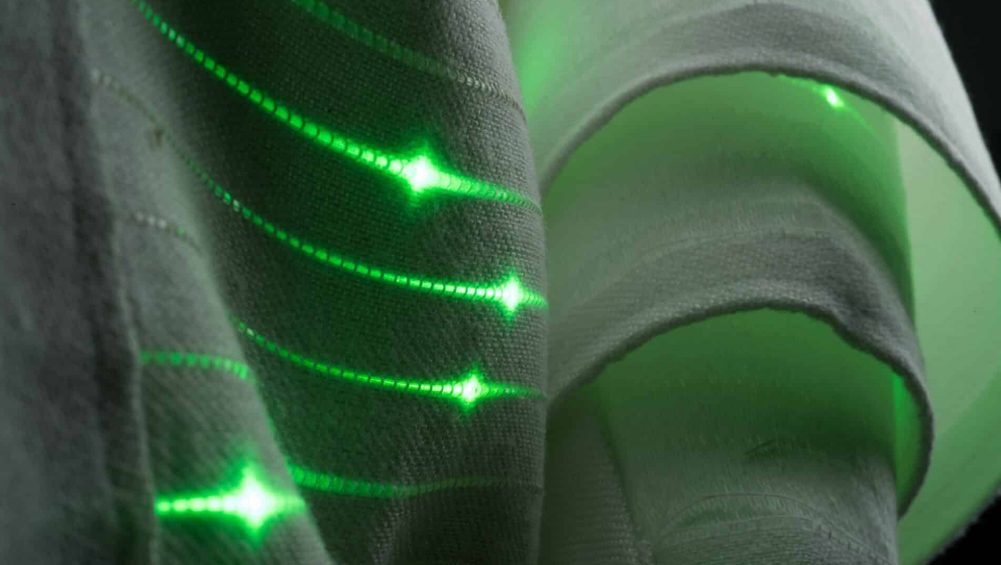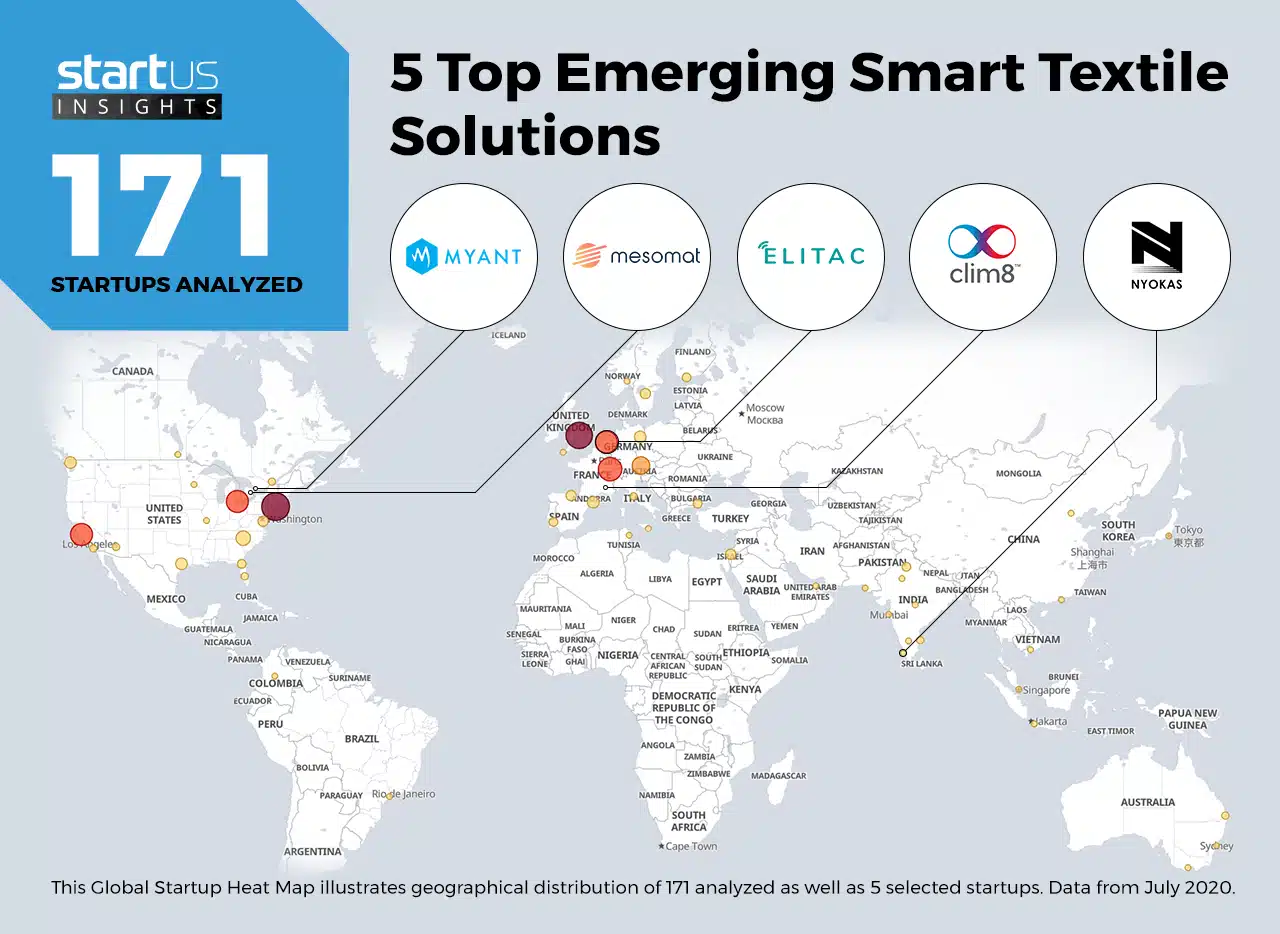
Category: TECHNOLOGY AND INNOVATION
Country: Netherlands
By Groundsailer Media BV
3rd April 2024
E-Textile & Smart Textile
In 2023, a wave of innovations swept through the smart textile industry, marked by groundbreaking advancements from global research institutions. These developments herald a new era in the integration of technology and textiles, offering transformative potential across various sectors.
From WSU’s electrically conductive, cotton-like fibres to MIT’s temperature-responsive FibeRobo, innovative breakthroughs are reshaping the landscape of smart textiles. These advancements, such as Singapore’s spider-inspired durable fibres and Canada’s heat and electricity-activated materials, highlight the versatility of this rapidly evolving field. These developments not only enhance textile functionality but also open new avenues in healthcare, automotive, and fashion industries, blending traditional craftsmanship with cutting-edge technology.
WSU’s Pioneering Cotton-Like Fibre
A breakthrough in smart textile innovation emerges from Washington State University (WSU), where researchers have developed a single strand of fiber combining the flexibility of cotton with the electric conductivity of polyaniline polymer. Published in the journal Carbohydrate Polymers, their study showcases the potential of these fibers for wearable e-textiles. Led by Hang Liu, the WSU team envisions integrating these fibers into apparel as sensor patches with flexible circuits, catering to diverse applications such as hazardous exposure detection for firefighters or health monitoring in everyday clothing.
Overcoming challenges in mixing the conductive polymer with cotton cellulose, the researchers devised a method involving dissolving recycled t-shirt cellulose and the conductive polymer separately before merging them side-by-side. This delicate balance at the interface ensures optimal bonding without compromising conductivity. Supported by the National Science Foundation and the Walmart Foundation Project, this research underscores the transformative role of interdisciplinary collaboration in advancing smart textile technologies.
MIT’s Shape-Changing FibeRobo
MIT researchers have unveiled FibeRobo, a programmable fiber poised to revolutionize textile manufacturing and wearable technology. This low-cost fiber exhibits remarkable shape-changing capabilities, contracting in response to temperature changes and reverting without embedded sensors or hard components. Compatible with existing textile manufacturing techniques, including weaving looms and industrial knitting machines, FibeRobo offers endless possibilities for adaptive performance wear and smart garments.
By incorporating conductive thread, it can be activated electrically, enabling digital control over fabric form. Jack Forman, the lead author, highlights the fiber’s potential to transform everyday textiles into responsive and dynamic materials, seamlessly integrating functionality into fashion. Through meticulous fabrication processes, the team produced FibeRobo at a fraction of the cost of commercially available alternatives. With applications ranging from adaptive sports bras to compression jackets for pets, this groundbreaking fiber heralds a new era of interactive and versatile textiles. Collaborators from MIT and Northeastern University contributed to this interdisciplinary research, supported by various grants and fellowships.
Singapore’s Spiders-Inspired Soft Fibres
Taking inspiration from spiders’ silk-spinning process, researchers at the National University of Singapore (NUS) have developed an innovative method to produce soft, recyclable fibers for smart textiles. This method, known as phase separation-enabled ambient (PSEA) spinning, allows for the creation of strong, stretchable, and electrically conductive fibers at room temperature and pressure. By mimicking the natural process of spider silk formation, the team successfully integrated three key properties into the fibers: strength, elasticity, and electrical conductivity.
These fibers, made from a gel solution of polyacrylonitrile (PAN) and silver ions, demonstrate promising applications in smart technology, including interactive gaming gloves and temperature-sensing face masks. Moreover, the environmentally friendly aspect of these fibers lies in their recyclability, as they can be dissolved in a common solvent and reused to produce new fibers. This breakthrough offers a sustainable and efficient solution for the production of functional soft fibers in various smart applications.
Canadian Innovation: Heat and Electricity-Activated Materials
Researchers at the University of Waterloo have developed a groundbreaking smart material that responds to both heat and electricity, marking the first of its kind to do so. This innovative fabric opens doors to various applications, including self-warming clothing and resilient vehicle bumpers. Made from polymer nano-composite fibers sourced from recycled plastic, the fabric can change color and shape upon stimulation. Dr. Milad Kamkar, a chemical engineering professor at Waterloo, highlights its potential in AI, robotics, and virtual reality experiences.
The fabric’s design blends soft and hard materials, utilizing highly engineered polymer composites and stainless steel in its woven structure. Moreover, the fabric can be activated with lower voltage, enhancing energy efficiency and enabling integration into smaller devices like biomedical tools and environmental sensors. Inspired by biomimicry, the material’s ability to sense and react to environmental stimuli offers possibilities for eco-friendly monitoring applications. Moving forward, researchers aim to enhance the fabric’s shape-memory capabilities for use in robotic systems, envisioning versatile robots capable of carrying and transferring weight efficiently.
UK’s Sustainable Smart Textiles with Integrated Functionality
Researchers from the University of Cambridge advocate for a paradigm shift in e-textile manufacturing towards sustainability, highlighting the need for a transition to unlock innovative designs within a circular economy framework. Embracing the 4R design concept—repair, recycle, replace, reduce—alongside functional fiber production and biofabrication techniques, they propose a revolutionary approach. By integrating these concepts, they aim to address challenges such as high costs and environmental impacts associated with e-textile production.
Their strategy emphasizes material innovations, modular designs, and user-centric approaches to enhance affordability, versatility, and durability. Moreover, they envision a future where e-textiles incorporate self-healing mechanisms, facilitate recycling, and utilize renewable materials, ultimately leading to sustainable and customizable fabric designs. This collaborative effort seeks to redefine e-textile manufacturing, promoting a shift towards decentralized, additive manufacturing platforms for on-site production and repair.
Finnish Ingenuity: Temperature-Reactive Smart Fabrics
Researchers at Aalto University have developed innovative textiles that undergo shape changes in response to heat, offering designers a plethora of creative possibilities. By utilizing liquid crystalline elastomers (LCEs), which can react to various stimuli, the team has woven these smart materials into fabrics using conventional textile crafting techniques. Collaborating with experts from the University of Cambridge, they explored different weaving patterns and tested how these fabrics respond to heat. The results showed reversible contractions in all LCE fabrics when heated, with each pattern exhibiting a unique response.
Additionally, the team demonstrated a proof-of-concept by weaving LCE yarns with other materials to create a fabric that transforms into a cone when heated and returns to its original shape upon cooling. This interdisciplinary research showcases the potential of integrating advanced materials with traditional textile methods, paving the way for the development of responsive textiles with diverse applications in fashion, healthcare, and interior design.
The Global Startup Heat Map Highlights 5 Top Smart Textile Solutions
In the dynamic landscape of the wearables industry, staying competitive requires leveraging data-driven insights. Through our analysis of over 2 million startups and scaleups worldwide, we present five hand-picked startups pioneering smart textile solutions. Our research, powered by the StartUs Insights Discovery Platform, offers comprehensive coverage of emerging technologies and relevant ventures.
The Global Startup Heat Map showcases 171 exemplary entities, with five standout startups selected based on criteria such as founding year and funding raised. This report provides in-depth insights into the innovative solutions offered by these selected startups, empowering industry stakeholders to stay ahead of the technology curve.

MesoMat develops Conductive Textiles
Conductive textiles are revolutionizing electronic textile applications across diverse sectors such as sports, healthcare, and entertainment. These textiles enable the creation of sensors and smart garments for health monitoring and performance tracking. Advancements in conductive textile technology, particularly in flexibility and biosensing capabilities, facilitate the seamless integration of electronic functionalities into smart fabrics.
One notable innovator in this field is the Canadian startup MesoMat, which specializes in developing a proprietary wire with exceptional conductivity. Leveraging the principles of self-assembly, MesoMat engineers ultra-durable fibers that boast remarkable stretchability, expanding by over 50% while maintaining conductivity. Moreover, the fabric seamlessly interfaces with traditional electronic components, thanks to MesoMat’s proprietary soft solder technology. This innovative approach not only enhances the durability and flexibility of conductive textiles but also streamlines their integration into electronic systems, paving the way for a new generation of smart clothing and wearable technology.
Nyoka Technologies Offers Soft Electronic Circuits
The burgeoning wearable market continues to introduce a diverse array of innovative products, from smart shirts capable of monitoring vital signs to jackets designed to enhance women’s safety. At the heart of these advancements are soft electronic circuit systems, pivotal in enabling the development of intelligent fabrics with sensing and analytical capabilities seamlessly integrated into textile products.
One notable player in this arena is Nyoka Technologies, an Indian startup specializing in the design and manufacturing of soft and flexible circuit systems. Nyoka’s solutions are tailored to meet the specific size, shape, and functionality requirements of its clients, offering customizable options to suit various applications. Among its notable innovations is the development of “Zeal,” a safety jacket designed for women. Equipped with advanced sensors, Zeal can detect potential threats and automatically deter attackers by delivering a mild electric shock. Additionally, it can transmit location information and send out SOS alerts, enhancing personal safety and security for the wearer.
Clim8 Makes Intelligent Thermal Textile
Temperature monitoring and regulation stand as crucial applications within the realm of e-textile solutions. Startups are spearheading innovation in intelligent thermal textile technologies, facilitating the development of smart garments capable of seamlessly sensing and managing body heat for optimal comfort.
One such innovator is the French startup Clim8, renowned for its provision of intelligent thermal systems integrated into temperature-regulating garments. At the core of Clim8’s technology are miniature thermal sensors adept at monitoring the user’s skin temperature. Leveraging data analytics encompassing environmental factors, user preferences, and specific requirements, Clim8’s solution dynamically activates heating elements and regulates body temperature accordingly. This innovative approach not only ensures enhanced comfort for the wearer but also represents a significant advancement in the field of wearable temperature control systems.
Myant Enables Textile Computing
With the integration of smart fabrics into daily life, a new avenue emerges for monitoring various aspects of consumers’ well-being. Startups are leveraging textiles alongside monitoring and analytics solutions to address challenges across diverse industries. For instance, some startups harness non-invasive sweat monitoring to provide personalized recommendations for hydration levels to athletes such as runners and cyclists.
Among these innovators is the Canadian startup Myant, which specializes in embedding sensors and actuators into everyday textiles to monitor body vitals and other parameters. Serving a wide array of industries including healthcare, fitness, workplace safety, automotive, aerospace, and connected environments, Myant is at the forefront of revolutionizing wearable technology. Additionally, amidst the COVID-19 pandemic, Myant is developing specialized solutions such as biometric textiles for remote patient monitoring and triaging, as well as antiviral masks and gloves tailored for essential service workers. This holistic approach underscores Myant’s commitment to advancing both individual well-being and public health through innovative textile solutions.
Elitac Provides Flexible Electronic Circuits
Traditional wearables often rely on rigid electronic components for sensing and providing functionality, which can lead to discomfort and susceptibility to damage during washing. However, the adoption of flexible electronic circuits presents a transformative solution, offering wearables that are comfortable, stretchable, washable, and seamlessly integrated into clothing. This shift significantly enhances the appeal of smart wearables among consumers, thereby driving revenue growth.
One notable player in this space is the Dutch startup Elitac, specializing in flexible electronics and haptic feedback applications within smart garments. Elitac collaborates with clients across diverse industries to conceptualize and produce innovative products tailored to their needs. Their portfolio includes wearables designed to assist individuals with severe balance disorders, electronic textiles for rehabilitation purposes, haptic feedback shirts for neurosurgeons, and haptic navigation belts for military personnel. Through their cutting-edge solutions, Elitac is pioneering the advancement of wearable technology, offering functional and user-friendly products that cater to a wide range of applications and industries.
Courtesy: Textilesinside.com
Copyrights © 2026 GLOBAL TEXTILE SOURCE. All rights reserved.